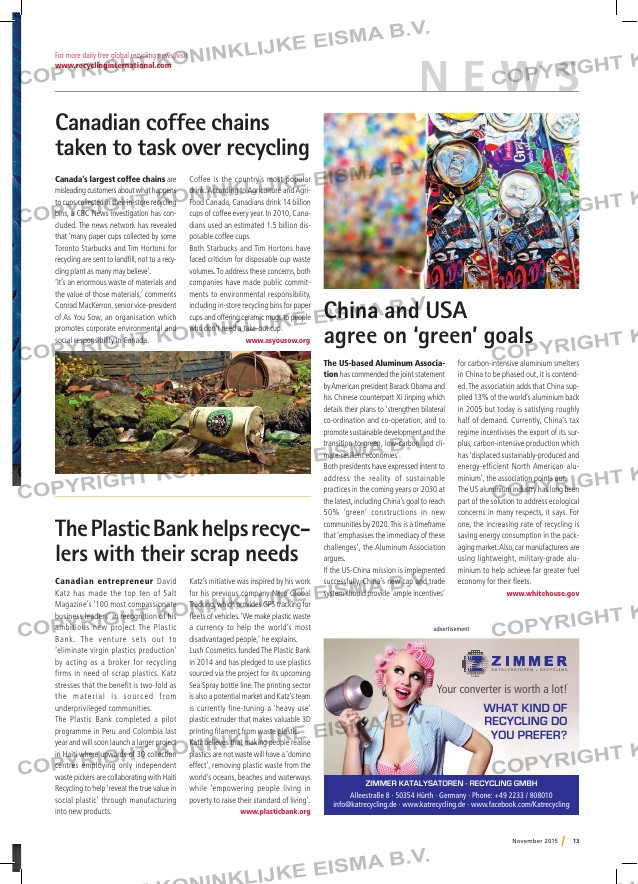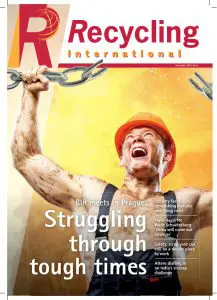Page 15 from: November 2015

N E W S
13November 2015
For more daily free global recycling news, visit
www.recyclinginternational.com
YOUR TRUSTED SOURCE
Products For Every Application
.
Alleestraße 8 · 50354 Hürth · Germany · Phone: +49 2233 / 808010
[email protected] · www.katrecycling.de · www.facebook.com/Katrecycling
Your converter is worth a lot!
WHAT KIND OF
RECYCLING DO
YOU PREFER?
ZIMMER KATALYSATOREN – RECYCLING GMBH
advertisement
China and USA
agree on ‘green’ goals
The US-based Aluminum Associa-
tion has commended the joint statement
by American president Barack Obama and
his Chinese counterpart Xi Jinping which
details their plans to ‘strengthen bilateral
co-ordination and co-operation, and to
promote sustainable development and the
transition to green, low-carbon and cli-
mate-resilient economies’.
Both presidents have expressed intent to
address the reality of sustainable
practices in the coming years or 2030 at
the latest, including China’s goal to reach
50% ‘green’ constructions in new
communities by 2020. This is a timeframe
that ‘emphasises the immediacy of these
challenges’, the Aluminum Association
argues.
If the US-China mission is implemented
successfully, China’s new cap and trade
system should provide ‘ample incentives’
for carbon-intensive aluminium smelters
in China to be phased out, it is contend-
ed. The association adds that China sup-
plied 13% of the world’s aluminium back
in 2005 but today is satisfying roughly
half of demand. Currently, China’s tax
regime incentivises the export of its sur-
plus, carbon-intensive production which
has ‘displaced sustainably-produced and
energy-efficient North American alu-
minium’, the association points out.
The US aluminium industry has long been
part of the solution to address ecological
concerns in many respects, it says. For
one, the increasing rate of recycling is
saving energy consumption in the pack-
aging market. Also, car manufacturers are
using lightweight, military-grade alu-
minium to help achieve far greater fuel
economy for their fleets.
www.whitehouse.gov
The Plastic Bank helps recyc-
lers with their scrap needs
Canadian entrepreneur David
Katz has made the top ten of Salt
Magazine’s ‘100 most compassionate
business leaders’ in recognition of his
ambitious new project The Plastic
Bank. The venture sets out to
‘eliminate virgin plastics production’
by acting as a broker for recycling
firms in need of scrap plastics. Katz
stresses that the benefit is two-fold as
the mate r i a l i s sou r ced f rom
underprivileged communities.
The Plastic Bank completed a pilot
programme in Peru and Colombia last
year and will soon launch a larger project
in Haiti where upwards of 30 collection
centres employing only independent
waste pickers are collaborating with Haiti
Recycling to help ‘reveal the true value in
social plastic’ through manufacturing
into new products.
Katz’s initiative was inspired by his work
for his previous company Nero Global
Tracking, which provides GPS tracking for
fleets of vehicles. ‘We make plastic waste
a currency to help the world’s most
disadvantaged people,’ he explains.
Lush Cosmetics funded The Plastic Bank
in 2014 and has pledged to use plastics
sourced via the project for its upcoming
Sea Spray bottle line. The printing sector
is also a potential market and Katz’s team
is currently fine-tuning a ‘heavy use’
plastic extruder that makes valuable 3D
printing filament from waste plastic.
Katz believes that making people realise
plastics are not waste will have a ‘domino
effect’, removing plastic waste from the
world’s oceans, beaches and waterways
while ‘empowering people living in
poverty to raise their standard of living’.
www.plasticbank.org
Canadian coffee chains
taken to task over recycling
Canada’s largest coffee chains are
misleading customers about what happens
to cups collected in their in-store recycling
bins, a CBC News investigation has con-
cluded. The news network has revealed
that ‘many paper cups collected by some
Toronto Starbucks and Tim Hortons for
recycling are sent to landfill, not to a recy-
cling plant as many may believe’.
‘It’s an enormous waste of materials and
the value of those materials,’ comments
Conrad MacKerron, senior vice-president
of As You Sow, an organisation which
promotes corporate environmental and
social responsibility in Canada.
Coffee is the country’s most popular
drink. According to Agriculture and Agri-
Food Canada, Canadians drink 14 billion
cups of coffee every year. In 2010, Cana-
dians used an estimated 1.5 billion dis-
posable coffee cups.
Both Starbucks and Tim Hortons have
faced criticism for disposable cup waste
volumes. To address these concerns, both
companies have made public commit-
ments to environmental responsibility,
including in-store recycling bins for paper
cups and offering ceramic mugs to people
who don’t need a take-out cup.
www.asyousow.org



